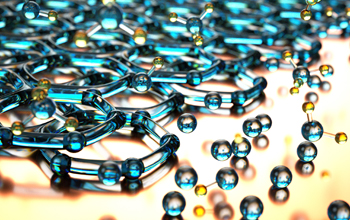Multimedia Gallery
Bi-layer Graphene (Image 1)
Researchers at the University of California, Santa Barbara (UCSB), have successfully controlled the growth of high-quality, bi-layered graphene on a copper substrate using a method called chemical vapor deposition (CVD), which breaks down molecules of methane gas to build graphene sheets with carbon atoms. The discovery could pave the way for next-generation electronics application.
Kaustav Banerjee, a professor in the Electrical and Computer Engineering Department and director of the Nanoelectronics Research Lab at UCSB, led the research team that perfected the methods of growing the graphene sheets. Says Banerjee, "For the electronics industry to effectively use graphene, it must first be grown selectively and in larger sheets. We have developed a synthesis technique that yields high-quality and high-uniformity graphene that can be translated into a scalable process for industry applications."
The discovery turns graphene production into an industry-friendly process by improving the quality and uniformity of graphene using efficient and reproducible methods. The team was able to control the number of graphene layers produced--from mono-layer to bi-layer graphene--an important distinction for future applications in electronics and other technology.
This research was supported by the National Science Foundation (NSF) under grant CCF 08-11880. This work made use of the Materials Research Laboratory central facilities at UCSB, supported by the NSF Materials Research Science and Engineering Centers (MRSEC) program (under grant DMR 05-20415).
To learn more about this research, see the UCSB news release Growth of High Quality Graphene by UCSB Researchers a Critical Discovery for Producing Next Generation Electronics. (Date of Image: October 2011) [Image 1 of 2 related images. See Image 2.]
Credit: Peter Allen, University of California, Santa Barbara
See other images like this on your iPhone or iPad download NSF Science Zone on the Apple App Store.
Images and other media in the National Science Foundation Multimedia Gallery are available for use in print and electronic material by NSF employees, members of the media, university staff, teachers and the general public. All media in the gallery are intended for personal, educational and nonprofit/non-commercial use only.
Images credited to the National Science Foundation, a federal agency, are in the public domain. The images were created by employees of the United States Government as part of their official duties or prepared by contractors as "works for hire" for NSF. You may freely use NSF-credited images and, at your discretion, credit NSF with a "Courtesy: National Science Foundation" notation.
Additional information about general usage can be found in Conditions.
Also Available:
Download the high-resolution JPG version of the image. (8.1 MB)
Use your mouse to right-click (Mac users may need to Ctrl-click) the link above and choose the option that will save the file or target to your computer.

